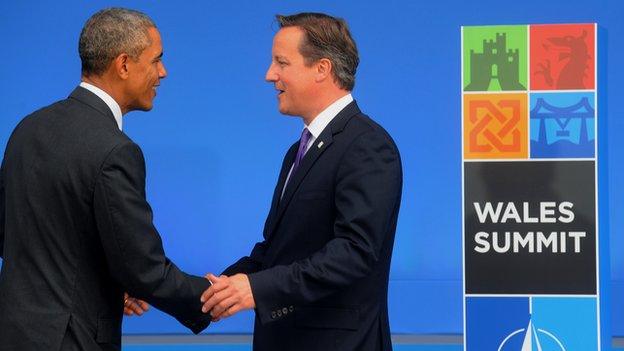Nato defence spending falls despite promises to reverse cuts
- Published
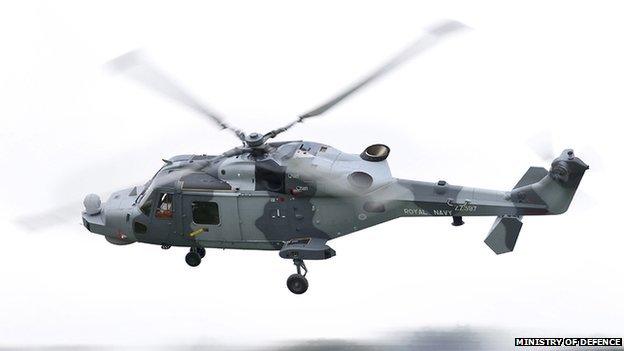
The UK will cut defence spending in 2015
Despite the Ukraine crisis and increasing tensions with Russia, most Nato members are doing little to reverse the decline in their defence spending.
The promises and rhetoric that they will meet the threat is not matched by reality.
New research by Ian Kearns and Denitsa Raynova, external of the European Leadership Network (ELN) found that six countries, including two of the biggest defence spenders in Europe, the UK and Germany, will cut defence expenditure in 2015.
Defence spending in France, the other big spender in Europe, will remain static.
The report examined the defence expenditure of 14 members of the alliance to see whether they were living up to recent promises made at the Nato summit in south Wales when David Cameron urged members, external to boost their defence spending.

Wales summit declaration
Allies currently meeting the Nato guideline to spend a minimum of 2% of their gross domestic product (GDP) on defence will aim to continue to do so.
Allies whose current proportion of GDP spent on defence is below this level will:
Halt any decline in defence expenditure
Aim to increase defence expenditure in real terms as GDP grows
Aim to move towards the 2% guideline within a decade

Nato has already set a target that member states should each spend a minimum of 2% of their national income or GDP on defence.
Few countries have met this target so at the Nato summit last September the commitment was watered down, with the less ambitious goal that those countries that were not meeting the target should "halt any decline in defence expenditure" .
ELN research predicts that in 2015 only one of the 14 nations examined, Estonia, will meet the 2% target. While expenditure will increase in Poland, Latvia, Lithuania, the Netherlands, Norway and Romania, none of these will meet the target.
The UK, Germany, Italy, Canada, Hungary and Bulgaria will cut their defence spending.
Britain currently just meets the 2% target, but the government is committed only to continuing that target until the end of this Parliament.

How British defence spending has changed
In 1814 British defence expenditure accounted for 21.8% of GDP
In 1914 British defence expenditure accounted for 3.2% of GDP

Examining current expenditure plans, the ELN concludes that defence spending in the UK will fall from its current level of 2.07% of GDP (£36.4bn) to 1.88% (£35.5bn) in 2015-16.
These figures are in line with earlier research carried out by the Royal United Services Institute, external which projected that UK defence spending could fall to about 1.7% of GDP by the end of the decade.
The ELN concludes that with other department spending such as health and international development ring-fenced, it will be hard to change this trajectory.
The report says: "This means that in 2015-16 the UK is on course to spend its lowest percentage of GDP on defence in any of the last 25 years."
The impact of recent defence cuts has already been felt in Britain and Germany.
Small crumb of comfort
Without any of its own maritime patrol aircraft, the UK recently had to request the help of Nato allies to search for suspected Russian submarines off the west coast of Scotland. In Germany there have been reports of serious malfunctions in military equipment.
The ELN report warns that if spending trends continue, this will "seriously undermine basic defence capability".
Europe's failure to pay its way in Nato is seriously worrying the US, which already provides 75% of all Nato defence expenditure (the US spends 3.8% of its GDP on defence).
The small crumb of comfort is that those countries that feel most threatened by Russia's recent actions in the Ukraine are upping their game.
Estonia will meet the 2% target this year, while Latvia, Lithuania and Poland are significantly increasing their defence spending. But the problem is that these countries are relatively minor military powers in Europe.
The big players like the UK, Germany and France are either cutting or freezing their spending.
Contrast that with Russia's defence spending, which is rising from 3.4% of its GDP this year to 4.2% next year ($81bn or £52.2bn). Russia is also stepping up its military activity.
A separate report by Ian Brzezinski for the Atlantic Council, external says there is also an "exercise gap" between Russia and Nato. Since 2013 Russia has conducted at least six military exercises involving 65,000-160,000 troops.
'Not all about size'
In contrast, Nato held fewer exercises involving fewer personnel. The largest of these, named Steadfast Jazz, involved 6,000 military personnel of which half were headquarter staff.
Nato officials insist size is not the only measure of commitment, but capability too. Russia is seeking to reverse years of underinvestment in its military.
So what should Nato countries be doing to bridge this divide in spending and flexing of military muscle?
The ELN research concludes that European Nato countries will have to work together more to arrest the decline, with burden-sharing becoming a necessity not a choice.
The report concludes: "It is clear that none of the Nato countries examined have the funding or the domestic support to fully modernise their militaries... more defence co-operation among allies is the only realistic way forward."
A Ministry of Defence spokesperson said: "With the second largest defence budget in Nato and the largest in Europe, the government is committed to spending 2% of GDP on defence. Decisions on spending after the financial year 2015-16 will be determined in the next spending review.
"Over the next decade we are committed to spending £163bn on equipment and equipment support to keep Britain safe. That includes new strike fighters, more surveillance aircraft, hunter-killer submarines, two aircraft carriers and the most advanced armoured vehicles."
- Published23 February 2015
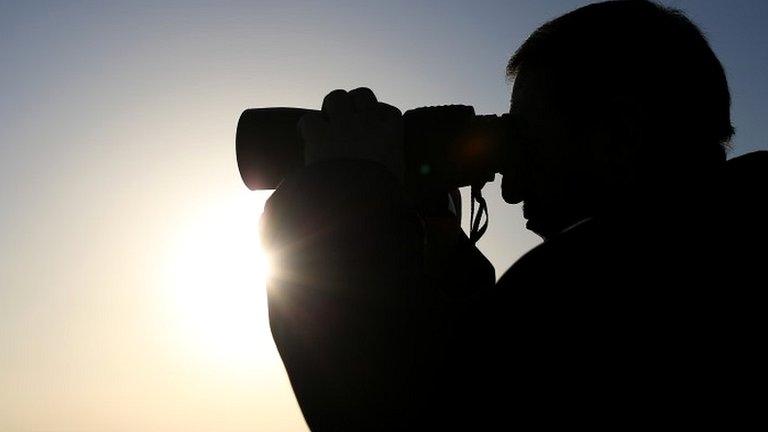
- Published24 February 2015
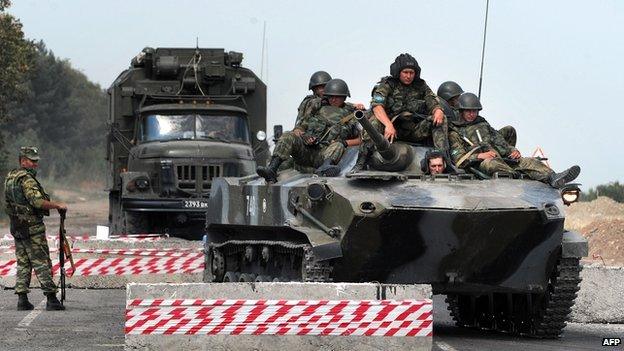
- Published18 February 2015
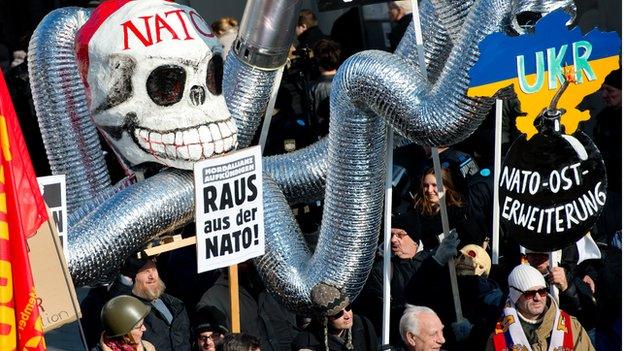
- Published5 February 2015
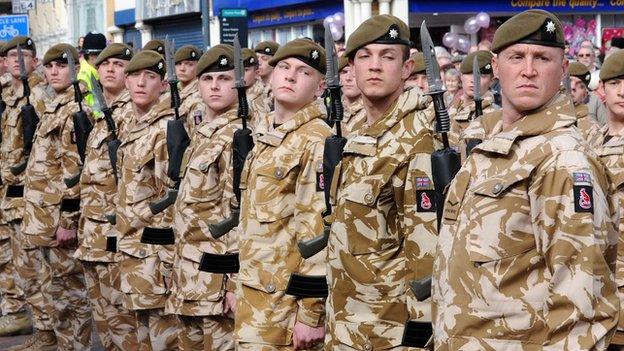
- Published5 February 2015
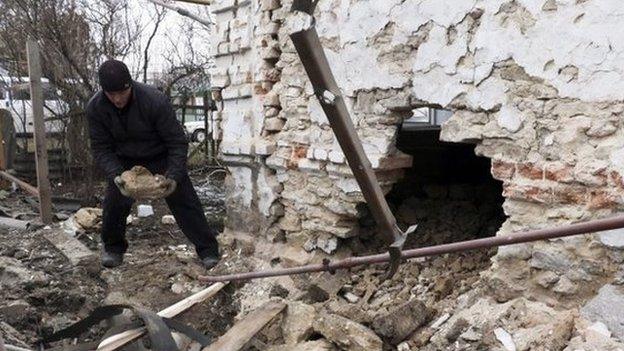
- Published4 September 2014
